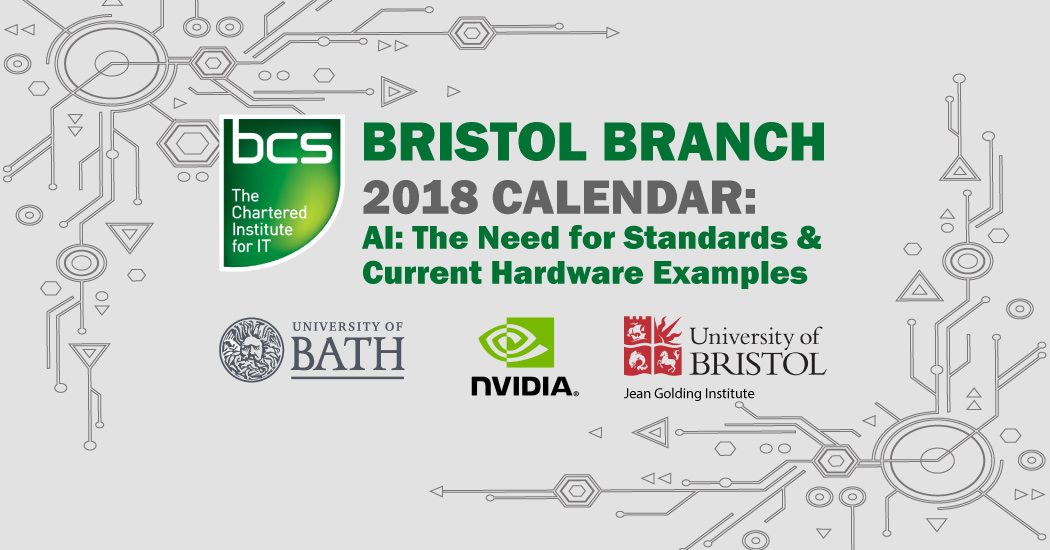- March 14, 2018
- Posted by: Lloyd Skinner
- Category: BCS

Wednesday April 18th, Registration 6.45pm @ Peel & Hepple Lecture Theatres, School of Geographical Sciences, University of Bristol, BS8 1SS
BCS, The Chartered Institute for IT, is committed to making IT good for society. We use the power of our network to bring about positive, tangible change.
After the unparalleled success of the first talk in the 2018 programme card, hot on its heels we are pleased to announce Talk 2. The series of talks continue the theme of “of now” technology subject matters and try to de-mystify some of these subjects and provide for objective commentary.
The second talk, also supported by the University of Bristol’s Jean Golding Institute, will focus on AI and Machine Learning and will take place on Wednesday 18th April at the Peel & Hepple Lecture Theatres, School of Geographical Sciences, University of Bristol, BS8 1SS. This talk will be delivered by two representatives with varied experiences. Thomas Bradley, from NVIDIA, will discuss the growth of Deep Learning and how AI hardware is evolving, and Dr Joanna Bryson will discuss the need for standards in the AI field. Their brief biographies can be found below.
The session will start with registration at 6.45pm, talks starting at 7.15pm, followed by an hour of talks from our panel, followed by Q&A, with networking and drinks to finish by c.9pm.
The event is free of charge, but will require registration to ensure there are no capacity restrictions.
The BCS talks are scheduled to be held in various locations throughout Bristol, where the majority of members are located. The talks aim to appeal to both existing and new members, young and old, and broadly technical and non-technical. The content of future topics are being investigated based on feedback form previous events.
I do hope you can attend the talk – please register using the following link: https://bcsbristol1804.eventbrite.co.uk
Any queries, please contact Lloyd Skinner at [email protected]
Speakers Biogs:
Dr Joanna Bryson – Associate Professor
Photo credit: OECD/Hervé Cortinat
Joanna Bryson is a Reader (tenured Associate Professor) at the University of Bath, United Kingdom, and an affiliate of Princeton University’s Center for Information Technology Policy (CITP). Her academic interests include the structure and utility of intelligence, both natural and artificial. Venues for her research range from “reddit” to ”Science”. She is best known for her work on AI systems and AI ethics, both of which she began during her doctoral work in the 1990s, but she and her colleagues publish broadly – in biology, anthropology, sociology, philosophy, cognitive science, and politics. Current projects include “The Limits of Transparency for Humanoid Robotics” funded by AXA Research, and “Public Goods and Artificial Intelligence” (with Alin Coman of Princeton University’s Department of Psychology and Mark Riedl of Georgia Tech) funded by Princeton’s University Center for Human Values. Other current research includes understanding the causality behind the correlation between wealth inequality and political polarization, generating transparency for AI systems, and conducting research on machine prejudice deriving from human semantics. Bryson holds degrees in psychology from the University of Chicago and the University of Edinburgh, and in artificial intelligence from the University of Edinburgh and the Massachusetts Institute of Technology (MIT). At Bath, she founded the Intelligent Systems research group (one of four in the Department of Computer Science) and heads their Artificial Models of Natural Intelligence.
Thomas Bradley – Director of Developer Technology @ Nvidia
Thomas Bradley holds a first-class MEng from the University of Bristol, UK, and l’École Nationale Supérieure de Télécommunications in Brest, France. Starting as a digital hardware designer he worked for several years as a processor architect for video encoding processors at STMicroelectronics before moving to ClearSpeed Technology plc to lead their architecture development for general purpose parallel processors. Since then he has specialised in High Performance Computing at ClearSpeed and at NVIDIA, where he is Director of Developer Technology, leading the GPU computing group in artificial intelligence, data analytics, and scientific computing in EMEA, Russia and India.


